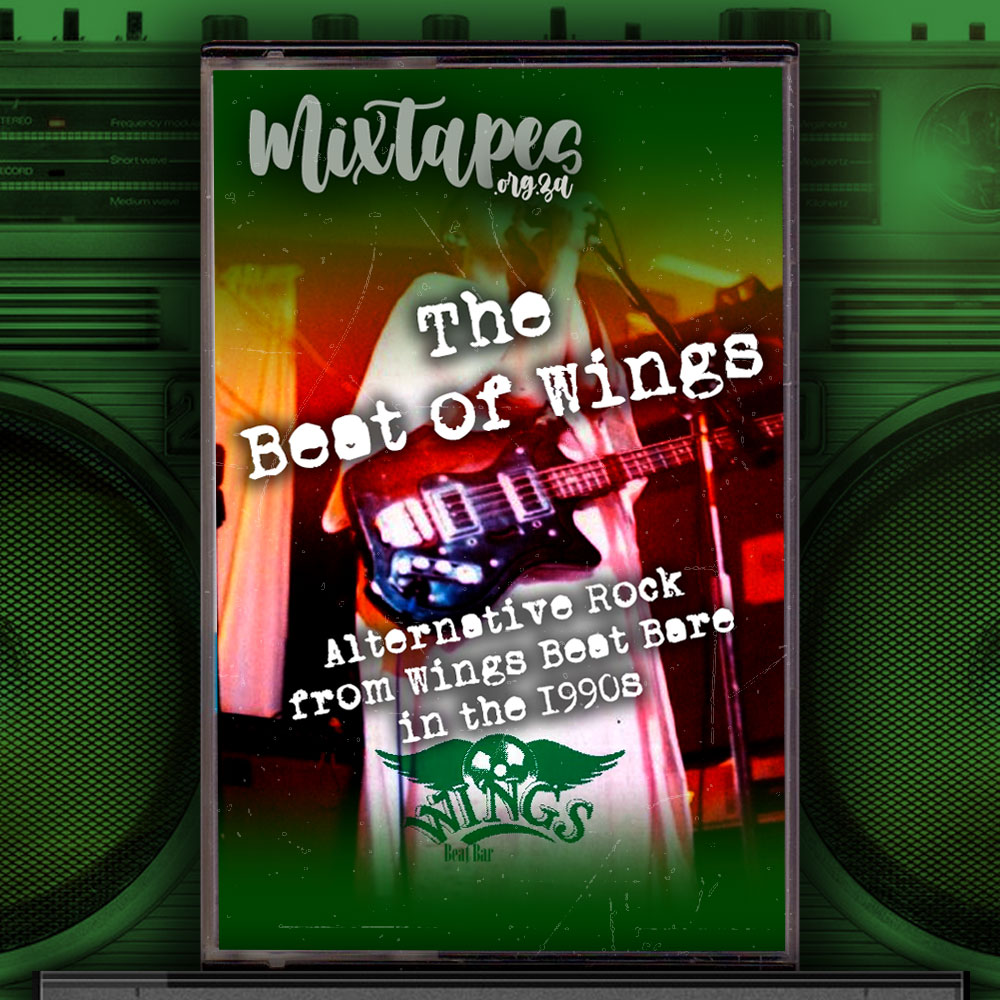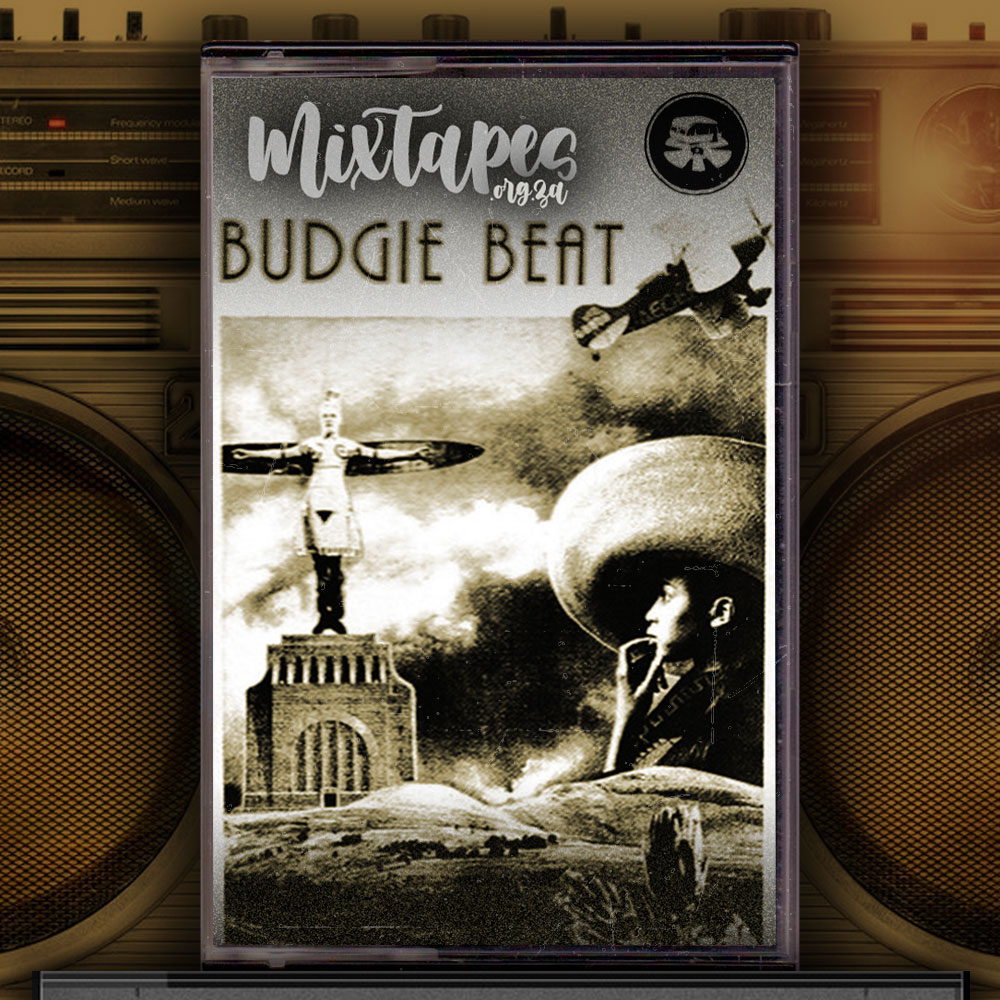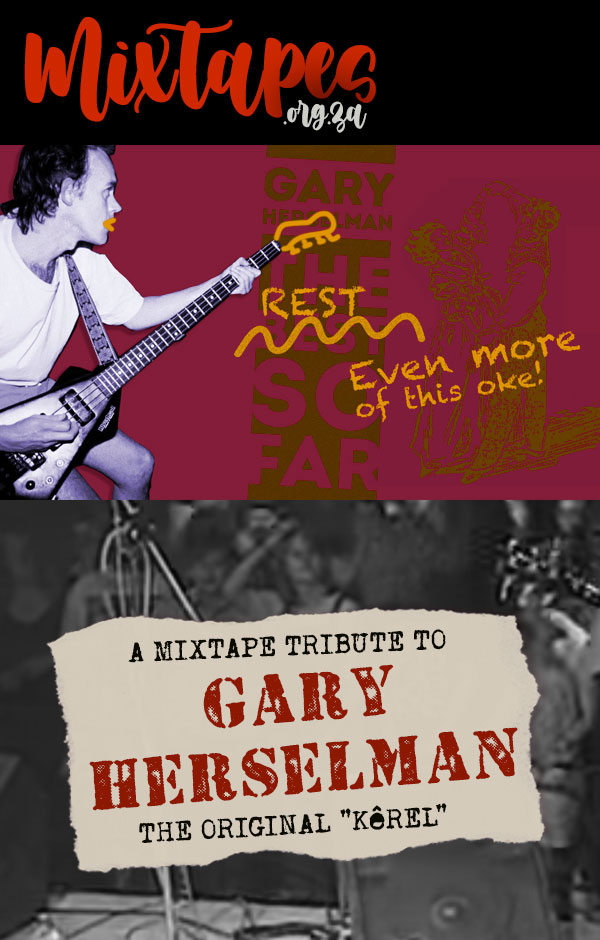
About a year ago, out of the blue, I got an email from Danny De Wet, the veteran drummer who played with so many iconic SA bands, but was also a manager and producer and all round personality on the South AFrican music scene. I knew Danny from the 90s when he ran one of the alternative rock scene’s most popular Jo’burg music venue, Wings Beat Bar, in Braamfontein. My band at the time, Occam’s Razor played there very often as well as hanging out there to watch other bands, many of them friends. Wings was more than a club, it was a community.
Anyway, the point of Danny’s email was to ask me to write a few memories about WIngs for his memoirs, which have now been published as “Sex, Drugs, Rock ‘n’ Roll…. In Africa”. GIving it some thought, the memories of that time came flooding back and I may have gotten carried away. The unexpurgated version I’ll reproduce below, and I believe a chunk of it made Danny’s book – which I plan to get my hands on as soon as copies make their way to the UK.
I have based this ‘mixtape’ on those memories. Here are the bands I remember, Some of them are good friends today, others I still admire from afar, and others I just remember fondly from the time we were all trying to make it on the music scene.
Most of what I have to say is in the text I sent to Danny, but here are a few additional notes: SOme of the bands I mentioned never recorded, but transformed or reformed and did so later. I don’t think Blue Chameleon of 8-Legged Groove Machine recorded, or if they did, their stuff is like hen’s teeth, so I have substituted their later incarnations as Boo! And Wonderboom respectively. Oh, and hippy duo Ocean Road became Qkumba Zoo, and actually had an international dance hit with The Child Inside.
In the spirit of mixtapes from back in the day, this one contains two tracks recorded off the radio – I can’t think where else you’d find the demo singles from Occam’s Razor or B-World today, so both are taped off the Barney Simon show on 5FM (in 1994), and I’ve left in some of the call-ins and banter from Mr Simon.
Two tracks, I taped myself at Wings via the sound desk: The first is Matthew van der Want singing Dying Of Love, and the second is me, with Heidi Bouwer on violin, playing Another Day – both from one of the folk evenings regularly hosted at Wings.
It is an eclectic mix of everything from folk to metal and a snapshot of the rock scene in Jo’burg in the 90s.
“The Beat of Wings”
The early 1990s was a strange and exhilarating time for a young South African rock musician. Freed from the burden of ‘national service’ and, with the release of Nelson Mandela and the anticipation of a brighter future in which we could hold our heads up high in the international arena, anything seemed possible. Except that is, for finding a gig if you were – like my band, Occam’s Razor – playing original music, a bit ‘alternative, and just starting out.
Apart from a few massive bands like Savuka, Hotline, Petit Cheval, eVoid, Mango Groove, and others, who played arenas, the local South African music scene in the clubs and bars had always favoured the cover band, and if it wasn’t blues-rock, it had to be FM radio-friendly pop, or of course, jazz. But the Voelvry phenomenon of the late 80s, built on the alternative scene around Shifty records and the famous Jameson’s bar, had spawned a new generation of young hopefuls even as they dialed back and closed down themselves.
So where was my band of ‘The Velvet Underground meets Metallica’ misfits (a concept so daft that it took Lou Reed himself another 20 years to think of it) supposed to go? Where was “The Scene”? Luckily the incredibly forward-thinking drummer, Danny De Wet, a veteran of at least two of the biggest acts of the 80s, saw there was a need for the burgeoning South African rock renaissance to have a home, a clubhouse, and a stage. And that’s how we found ‘Wings Beat Bar’ in Braamfontein, just near Wits University. There we found our home-base for the next few years, along with so many other bands.
Sadly, the South African record industry was not as quick to pick up on the emerging talent and so many of the bands that strutted their stuff on the Wings stage are now just a memory, remembered only through demos played by 5FM jock Barney Simon (another champion of local music), or self-released EPs and tapes, compilation CDs, bootlegs, and if nothing else, in legend alone. As I think back a quarter of a century, the names of these bands pop into my head like files recovered off a faulty harddrive: The Sarsipians, Blue Chameleon, King Ink, Live Jimi Presley, B-World, Just Encasement, The Kerels, 8-Legged Groove Machine, Albino Tarbugz, 10 Drops of Valium, Damn the Icebergs, Metalmorphosis, and of course, Danny’s own band, The Electric Petals, and probably many more that I will remember if pressed.
And then there were the folkies, Matthew van der Want, Black Paul, and me, and the poets: Alan Finlay, Gary Cuminskey, Roy Blumenthal, and the purveyors of interpretive dance and monologues, who graced the stage of “Odyssey Theatre’ hosted at Wings on a Sunday night.
The soundsystem was thunderous. You could tell this venue was owned by a hard-rocker himself. There were no half-measures, like the clapped-out speaker-box on a beer crate you’d encounter at half-cocked clubs on the road. There was a proper mixer and a PA with headroom to spare so you always sounded great at Wings.
I have more vivid memories of Wings, I think, than any other venue I’ve played since and this was entirely down to the sense of community fostered by Danny and his business partner Patrick. Danny twirling his drumsticks like the moustache of Dali as the Petals showed how it was done, Matthew vd Want singing to a rapt audience about dying of love to a tune borrowed from Jennifer Ferguson, before launching into a blistering and raucous set backed by The Kerels, Live Jimi showing no regard for health and safety regulations as they attacked anvils with angle-grinders and god-knows-what to a pounding beat, Black Paul mumbling mysteriously, getting the funk out with the Groove Machine or B-World, and of course the pizza!
One of the perks of playing Wings was the pizza thrown in the deal. I’m not going to lie and say it was the world’s greatest pizza, but it was the greatest pizza a starving musso ever got! And for the student crowd and the young bohemians who guaranteed an audience on any night of the week, it was probably the cheap pizza that brought them there!
Of course for me, the night I remember the most was the time we got Wings into the Sunday Papers! Occam’s Razor will go down in Wings lore as the band that played a set stark naked. We had written a cycle of songs that saw us festoon the Wings stage with dismembered papier-mache cadavers and spray fake blood as we played exposing both body and soul. To this day I’m astonished that the Wings management let us make this “artistic statement”, but that is why I remember it as more than just a venue. It was a place that encouraged and nurtured artists and artistry in a way than few other venues ever did, and it was a sad day when Wings eventually closed its doors.
But how can you get a little of that Wings spirit today, you ask? Well, there is a dedicated Facebook group frequented by many of the musicians and punters; and there is the music, if you can find it: Matthew vd Want has released several albums which are on Bandcamp and can be found on online auctions shops and 2nds hand CD shops. Wonderboom (some of 8 Legged Groove Machine, with Danny on drums) released several albums which are easy to find. For collectors of CDs, The Electric Petals have an album called “Polynation’ and B-World put out a CD single which is like hen’s teeth, but out there somewhere. Some of the bands, like Occams, have stuff up on Soundcloud, and the absolute best source of Wings bands on CD is a two-volume compilation called “Soda Sex Fountain”, which is sadly hard to find, but not impossible. Oh, and Q-Zoo were originally a hippy-folk duo who were Wings regulars, but I don’t remember what they called themselves then. And Blue Chameleon morphed into Boo!, and they have several albums worth looking for.
At the end of the day, every scene is – to borrow words from Joni Mitchell – ‘a chalkmark in a rainstorm… the beat of wings’. Wings Beat Bar was of its time and place, and – as we contemplate the sterile world of Spotify playlists and ringtone music – I’ll stick my neck out and say, a better time, and a better place. I’ll always be grateful to have been given the opportunity to be part of it by Danny De Wet and his team at Wings Beat Bar. Long may it live on in our memories.
Brett Houston-Lock
April 2021
- Damn The Icebergs – Cycad
- Squeal – Long Pig
- Boo! – Lucki
- Qkumba Zoo – The Child Inside
- Wonderboom – She Cries
- The Electric Petals – Thank You For The Book James
- Occam’s Razor – They Can’t Find You
- B-World – Walk The Wire
- Matthew Van Der Want – Dying Of Love
- Brett Lock & Heidi Bouwer – Another Day
- King Ink – Wonderful Art
- Just Encasement – It Feels
- Urban Creep – Tightroper
- Sugardrive – Form The Habit
- Sarsippians – Crazy
- Metalmophosis – Passion Mother
- Albino Tarbugz – Motormouth
- Live Jimi Presley – Vorhaut Zur Freiheit
- The Kerels – U-Turn
- 10 Drops of Valium – Never Get Old





 1988 was a poor year for South African musicians on the Capital Countdown: only eight artists with nine songs made the Top 40 (there were two songs by
1988 was a poor year for South African musicians on the Capital Countdown: only eight artists with nine songs made the Top 40 (there were two songs by